"Ireland's Call" is a song used as a national anthem by some sports competitors representing the island of Ireland, originally and most notably the men's rugby union team. It was commissioned by the Irish Rugby Football Union (IRFU) for the 1995 World Cup, because a small number of the IRFU's members are Ulster unionists from Northern Ireland who would regard the use of the anthem of the Republic of Ireland as inappropriate.
"God Save Ireland" is an Irish rebel song celebrating the Manchester Martyrs, three Fenians executed in 1867. It served as an unofficial Irish national anthem for Irish nationalists from the 1870s to the 1910s.
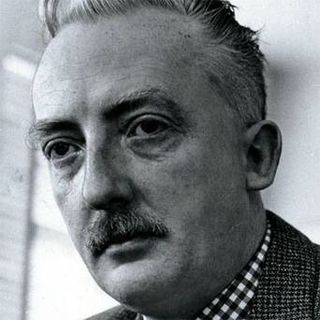
Seán Ó Riada, was an Irish composer and arranger of Irish traditional music. Through his incorporation of modern and traditional techniques he became the single most influential figure in the revival of Irish traditional music during the 1960s.

"Sometimes You Can't Make It on Your Own" is a song by Irish rock band U2. It is the third track on their eleventh studio album, How to Dismantle an Atomic Bomb (2004), and was released as the album's second single worldwide except in North America on 7 February 2005. Originally titled "Tough", the song is lyrically about the relationship between the band's lead vocalist Bono and his father Bob Hewson, who died of cancer in 2001.
"The Wild Rover" is a popular English-language Irish folk song.

"Na Na Hey Hey Kiss Him Goodbye" is a 1969 song written and recorded by Paul Leka, Gary DeCarlo and Dale Frashuer, attributed to a then-fictitious band they named "Steam". It was released under the Mercury subsidiary label Fontana and became a number one pop single on the Billboard Hot 100 in late 1969, and remained on the charts in early 1970.

"Here Comes the Hotstepper" is a song co-written and recorded by Jamaican dancehall artist Ini Kamoze. It was released as the lead single from his 1995 album Here Comes the Hotstepper as well as the soundtrack to the film Prêt-à-Porter. It is best known for its "naaaa na na na naaaa..." chorus inspired by the Wilson Pickett cover of "Land of 1000 Dances".

Proinsias Ó Maonaigh or Francie Mooney was a fiddler from Gweedore, County Donegal, Ireland. He is known for his distinguished fiddle playing and his unique and vast contribution to Irish music and culture. He is the father of Mairéad Ní Mhaonaigh and grandfather of fiddle player Ciarán Ó Maonaigh.
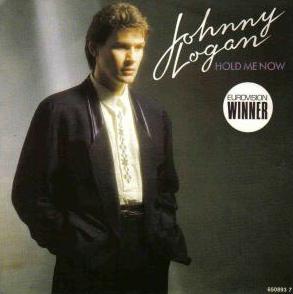
"Hold Me Now" is a song composed and performed by Irish singer Johnny Logan, which became the winner of the Eurovision Song Contest 1987 for Ireland. Logan had previously won with "What's Another Year?" in the 1980 contest and would go on to write the winner of the 1992 contest. The song is usually sung by Bohemians at home matches in Dalymount Park.

Michael McGlynn is an Irish composer, producer, director, and founder of the vocal ensemble Anúna.

"Games People Play" is a song written, composed, and performed by American singer-songwriter Joe South, released in August 1968, that won the Grammy Award for Best Contemporary Song and the Grammy Award for Song of the Year.
"Óró, sé do bheatha abhaile" or "Óró, sé do bheatha 'bhaile" is a traditional Irish song, that came to be known as a rebel song in the early 20th century. Óró is a cheer, while sé do bheatha 'bhaile means "welcome home", although it is better translated as "your birthright is back home".
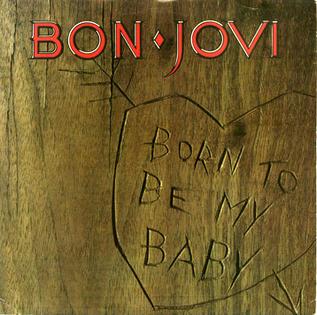
"Born to Be My Baby" is a song by American glam metal band Bon Jovi. It was written by Jon Bon Jovi, Richie Sambora, and Desmond Child. It was released on November 24, 1988 as the second single from their fourth studio album New Jersey. It peaked at number 3 on the Billboard Hot 100 in 1989, number 7 on the Mainstream Rock Tracks chart, number 22 in the UK, and number 30 in Australia.
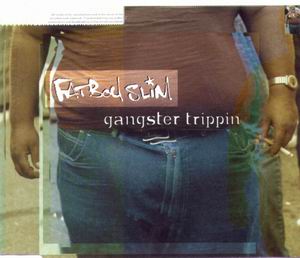
"Gangster Tripping" is a song by British big beat musician Fatboy Slim. It was released on 5 October 1998 as the second single from his second studio album,You've Come a Long Way, Baby (1998).
Non-lexical vocables, which may be mixed with meaningful text, are a form of nonsense syllable used in a wide variety of music. Common English examples would be "la la la", "na na na" or "da da da".
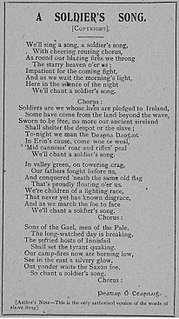
"Amhrán na bhFiann", called "The Soldier's Song" in English, is Ireland's national anthem. The music was composed by Peadar Kearney and Patrick Heeney, the original English lyrics by Kearney, and the Irish-language translation, now usually the version heard, by Liam Ó Rinn. The song has three verses, but only the choral refrain is used as the national anthem.

"Cuts Like a Knife" is a song by Canadian rock musician Bryan Adams. It was released in May 1983 as the second single from his third studio album Cuts Like a Knife (1983). It peaked at number 6 on the Billboard Top Rock Tracks chart and number 15 on the Billboard Hot 100. The song has appeared on all of Adams' compilation albums with the exception of The Best of Me.
"The Kerry Recruit" is an Irish song referring to the Crimean War. The song's lyrics are from the point of view of an Irish soldier.

"Sheela-Na-Gig" is a song by English alternative rock singer-songwriter PJ Harvey, written solely by Harvey. The song was released as the second single from her debut studio album, Dry, in February 1992. The single was the second, and final, single from Dry and only single from the album to enter the charts in both the United Kingdom and United States. An accompanying music video, directed by Maria Mochnacz, was released alongside the single.
"Old Rosin the Beau" is an American folk song popular in the 19th century, probably of British or Irish origin, first published in Philadelphia during 1838.












